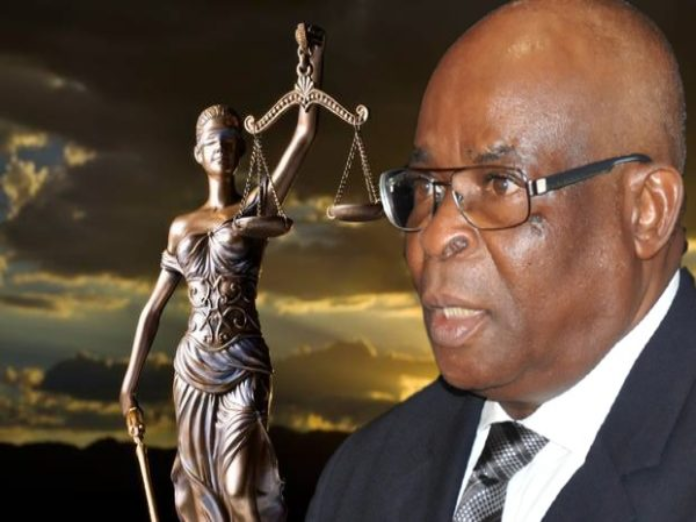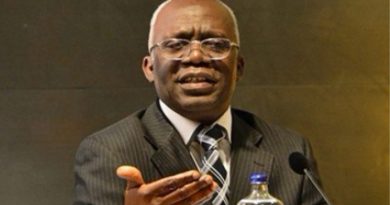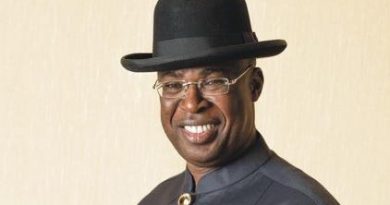EFCC investigates Onnoghen, NJC gives seven days to defend himself
The Economic and Financial Crimes Commission (EFCC) has queried the sources of inflows into the accounts of the suspended Chief Justice of Nigeria, Justice Walter Onnoghen.
It also said its investigation of the CJN indicated that the inflows “are not typical of the financial transactions of a public servant.”
The anti-graft agency asked the National Judicial Council (NJC) to consider its petition against Justice Onnoghen and asked him to defend himself.
Although the EFCC is still conducting more investigation on Justice Onnoghen, it forwarded a preliminary report to the NJC for consideration.
It was gathered that the decision of the NJC will guide the next action on the suspended CJN.
It was learnt that once the suspension of the CJN is ratified by the NJC or if Justice Onnoghen is asked to proceed on retirement, the EFCC will be at an advantage to grill him.
But in its petition, the EFCC said its investigation confirmed suspicious payments into the CJN’s accounts. Such funds include $30,000 allegedly paid by a Senior Advocate of Nigeria, Mr. Joe Agi, who was quizzed last week.
It said the sources of inflows into some of the CJN’s accounts were questionable.
“From the investigation conducted so far, it is possible that the payments into the various accounts might be bribes. This is because the sources of the inflows into his accounts other than the salary account in Union Bank of Nigeria Plc are unknown and probably fraudulent, and the nature of the transactions (including structured payments) is not typical of the financial transactions of a public servant.
The preliminary investigation report on Justice Onnoghen reads: “An Intelligence Report that the above mentioned subject was alleged to be involved in a number of bribery and corrupt activities.
“Upon receipt of the Report, a preliminary investigation was conducted during which the following actions were carried out.
A request was sent to the Nigeria Financial Intelligence Unit (NFIU) for a report on the suspect;
A letter of investigation activities was sent to Standard Chartered Bank, Union Bank and Heritage Bank to provide the statements of accounts of the suspect;
A BVN search through the NIBSS platform was conducted on the suspect and six (6) more accounts were found to be linked or connected to the suspect;
The statements of accounts of the suspect were analysed and further to that, a letter was written to Standard Chartered Bank requesting for additional information on suspicious activities in the account.
In the report to the NJC, the EFCC gave the details of how cash was remitted into the dollar, pound sterling, Euro and Naira accounts
The summary of the EFCC’s findings is as follows:
Standard Chartered Bank USD ($) Account:
The balance as at September 19, 2016 is $134,525.40;
The turnover in the account from October 2012 to September 2016 is $1,922,657.00
“The following highlights some of the suspicious activities in the account.
Pattern of structured payments of $10,000.00 each in 2012. For example, a total of $630,000.00 was credited to the accounts using this pattern.
Similarly structured payments of $10,000.00 amounting to $297,800.00, $50,000.00 and $36,000.00 were deposited in the account in 2013, 2015 and 2016 respectively;
There was also a credit of $121,116.00 into the account from 2014 to 2016 from Life Friend Plc. The payments were in four installments, of $30,279.00 each. These payments suggest the suspect has investments;
A payment of $482,966.00 from Alicia Redemption Pro and shortly after, $800,000.00 was invested in SCB Investment Subscription. We are in the process of verifying these transactions;
Other suspicious transactions in the account are credit of $19,764.00 from Pur of Noble and seven (7) payments of $3,250.00 each amounting to $22,750.00 from Lloyds TSB.
On the operation of the Pound Sterling account by the CJN, the EFCC added as follows: (a.) The balance as at September 30, 2016 was £108,348.00; (b). The turnover in the account from 2012 to September, 2016 was £138.439.00;
“The following highlights some of the suspicious activities in the account: (1) There was a self -transfer of £40,268.40 into the account on May 31, 2016; (2) There were also self-deposits by the suspect of £49,760.00 from July 2015 to September, 2016,” the report added.
On the Naira account in SCB, the EFCC put the “current balance as at December 18, 2013 was N1,276,024.65;
It said: “There was a turnover of N4,462,000.00 from 2011 to December, 2013.”
“The following highlights some of the suspicious activities in the account: A transfer of N41,262.000.00 ($260,000) was made from the Dollar account. The money was used to make payment of N41million to Ad hoc Committee on the Sale of Federal Government Houses, suggesting that he bought a property with proceeds of the transfer;
“The only other significant transactions in the accounts are six (6) structured cash payments of N500,000.00 each and one payment of N700,000.00 amounting to N3.7mlllion from November, 2013 to August, 2016.
Regarding the Euro account, the report said “turnover in the account from 2013 to September 2016 was €55,154.00 and the balance as at September 30, 2016 was €55,154.00;
“There were no significant transactions in the account from 2013.
Concerning the CJN’s separate Naira Account (Salary Account) in Union Bank, the report claimed that “the balance as at October 10, 2016 was N22,510,636.27 although the turnover in the account from September, 2005 to October, 2016 was N91,962.362.49;
“His salary in 2005 was N240,202.20 and it rose to N751,082.3 in February 2008. The salary remains within this range till date;
“He did not spend from the salary account from March 2015 to October 2016. The salary and allowances accumulated to N22,520,636.27 in October 2016 from N6,132 885.24 in March of same year.”
Source: The Nation




